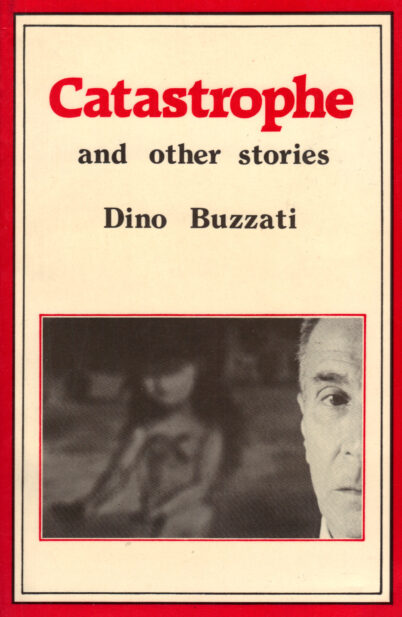 By DINO BUZZATI (Calder and Boyars; 1949/65)
By DINO BUZZATI (Calder and Boyars; 1949/65)
The shadow of Franz Kafka, it seems, will never be fully lifted. Anyone who writes anything remotely offbeat or surreal gets tagged with term Kafkaesque, regardless of how tenuous the connection actually is. That’s certainly the case with Italy’s brilliant Dino Buzzati (1906-1972), whose mind-tugging fiction has certain similarities with Kafka’s but is distinctive enough to warrant a category of its own (Buzzatiesque?).
1949’s CATASTROPHE was Buzzati’s most famous collection. “Seven Floors,” one of the standout entries, is authentically Kafkaesque in its corrosively satiric portrayal of a man trapped in a futuristic hospital, where a succession of errors on the part of the staff, combined with the stifling bureaucracy that rules the place, seal the man’s fate—despite the fact that his illness is actually quite minor. Also in the Kafkaesque category is “Landslide,” wherein a journalist hurries to the site of a reported landslide but can’t seem to find it anywhere.
What really gives Buzzati’s fiction its distinction is the disarmingly smooth, journalistic prose. The contents of CATASTROPHE may be weird, indeed often indescribably so (see “The Alarming Revenge of a Domestic Pet,” which clearly emerged directly from the subconscious), but the writing is unerringly calm and straightforward. That’s true even of those tales that really live up the book’s title, such as “The Collapse of the Baliverna,” about a man who breaks off a tiny part of a building which somehow results in the entire structure crashing down, and “Catastrophe,” about an unseen apocalyptic event witnessed entirely through the windows of a passing train.
Other stories involve the hunting and killing of the world’s last dragon (“The Slaying of the Dragon”), a harsh evocation of small town prejudice and xenophobia (“Just the Very Thing they Wanted”), a woman who goes to pieces after seeing what she thinks is an inhuman monstrosity in an attic (“The Monster”), a man visited by a doctor and a stranger one day for an apparently minor medical procedure that turns out to be something far, far more sinister (“Something Beginning with L”); and a LORD OF THE FLIES-esque portrayal of the suspicion and paranoia that engulf a gaggle of aristocratic opera-goers upon hearing unconfirmed rumors of a revolutionary uprising in their city (“The Scala Scare”).
The English translations of these tales were by Judith Landry and Cynthia Jolly, who both do superlative work. These stories may be over half a century old, but they represent the state of the art in surreal apprehension.
